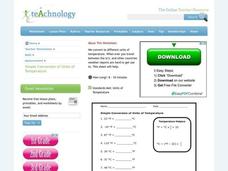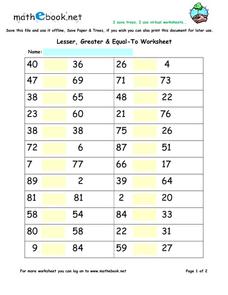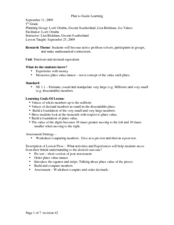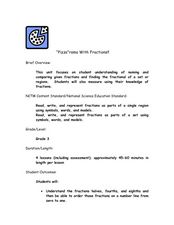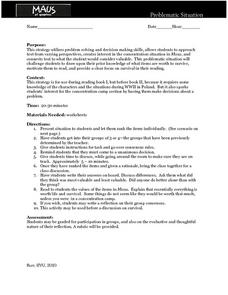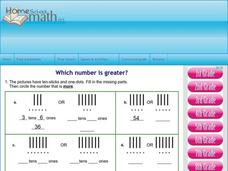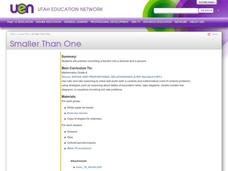Curated OER
Prioritizing National Economic Goals
Eighth graders define the generally accepted list of national economic goals. They discuss the compatability/incompatibility of goals. They participate in a consensus-building exercise to rank economic goals in order of importance.
Curated OER
What's Organic?
Students discuss background information presented by the teacher and read dictionary definitions for the words "organic" and "synthetic." In this gardengin lesson, students complete a worksheet on the material. Students grow and compare...
Curated OER
Math: Football League Statistics
Students examine a soccer league final standings chart and then answer 12 questions based on the information provided. They calculate some answers in both fractions and percentages.
Curated OER
Graphing and the Coordinate Plane
Students gain practice reading coordinates and plotting points by participating in the Coordinates! Game. They demonstrate and test their skills with graph paper and the Maze Game.
Curated OER
The Smallest Metric Measurements
In this metric measurement worksheet, students solve 15 problems in which three metric measurements in a series are analyzed. Students circle the smallest metric measurement in each problem.
Curated OER
Even and Odd Numbers
In this even and odd worksheet, students cut out 20 pieces of mail and study the address. Students paste (or just sort) the mail according to whether it would be delivered to the even side of the road or the odd side. The directions are...
Curated OER
Lesser, Greater, & Equal-To Worksheet
In these virtual worksheets, students complete two pages of number comparison exercises. Students must solve the exercise by filling in the greater than, less than, or equal to sign.
Curated OER
A Fraction of the Possibilities
Students review the conversion of fractions to decimals, develop strategies to compare fractions perform complex calculations using ratio techniques similar to the construction of fractions.
Curated OER
Fraction Fun
Students define properties of fractions and solve for them. In this algebra lesson, students rewrite fractions from mixed numbers to improper fractions. They reduce fractions using the GCF and convert the denominators correctly when...
Curated OER
Fractions and Decimal Equivalents: Fifth Grade
Sometimes a skeleton is all you get. This lesson outline provides teachers with a basic lesson flow. Pupils will pre-test, order place value names, use manipulatives, and build and compare numbers. How this is to be done is not...
Pennsylvania Department of Education
Seeing Doubles
Students work with dominoes to recognize the number of spots on each side as they relate to addition facts. In this seeing doubles lesson, students make triangle shaped flash cards for the double facts. Students represent the correct...
Curated OER
Comparing Numbers
In this number comparisons worksheet, 1st graders use the number line to help them find and circle the smaller number in the 55 problems.
PBS
Working with Coordinate Planes: Activities and Supplemental Materials
Seven activities make up a collection of supplemental materials to reinforce graphing on a coordinate plane. Worksheet objectives include plotting coordinates within single and four quadrants, measuring straight and diagonal lines, and...
Curated OER
"Pizza"rama With Fractions!!
Young mathematicians explore number values by utilizing food as a visual aide. They discuss the differences between halves, fourths, and eighths and how they are visually represented by a pizza. Then create their own pizza in class and...
Curated OER
Integers - Objects Model
Sixth and seventh graders solve 19 various types of problems related to integers as objects models. They write an integer that corresponds to each letter on a number line and then, arrange the integers from least to greatest. Pupils also...
PBS
Working with Coordinate Planes: Assessments
It's time for scholars to show what they know about coordinate planes with a collection of three assessments. The exams' objectives include plotting points on a single grid, measuring using the distance formula, and identifying points on...
Inside Mathematics
Functions
A function is like a machine that has an input and an output. Challenge scholars to look at the eight given points and determine the two functions that would fit four of the points each — one is linear and the other non-linear. The...
Curated OER
Maus: Problematic Situation Strategy
Do people really need “a newer, bigger Holocaust” in order to change? Or is it possible that by making text-to-self connections to the stories of others people that they can change? In order to connect to Art Spiegelman’s Maus, class...
Curated OER
Which Number is Greater?
Pupils draw pictures of two digit numbers to identify the greater value. In this math lesson, students plot two digit numbers on a number line and identify the greatest or lesser value. Pupils use the greater than and less than symbols...
Curated OER
Smaller Than One
Sixth graders practice converting a fraction into a decimal and a percent. They explain relationships among rational numbers. They order and compare whole numbers, fractions (including mixed numbers), and decimals using a variety of...
Curated OER
Working with Integers
In this integers instructional activity, students compare the pairs of integers and mark either less than or greater than to show which number is greater. The first two are done for the students. The second part of the instructional...
Curated OER
Decimals and Percents
In this decimals and percents worksheet, 8th graders solve 26 different types of problems that include expressing numbers as a decimal and a percent. Then they change each number to fractions and determine the unknown number for each...
Curated OER
Time: Attribute
Students participate in five teacher-led, whole class activities that explore sequences of time and the concept of faster and slower. They sequence school day events, create a book of their daily schedule, put the days of the week in...
Curated OER
Egyptian Hireroglyphs
Fifth graders identify the aspects of Ancient Egyptians and Heiroglyphs. They compare and contrast Egyptian Hieroglyphs with the decimal number system. Students recognize the decimal number system and compares to bases other than ten.






